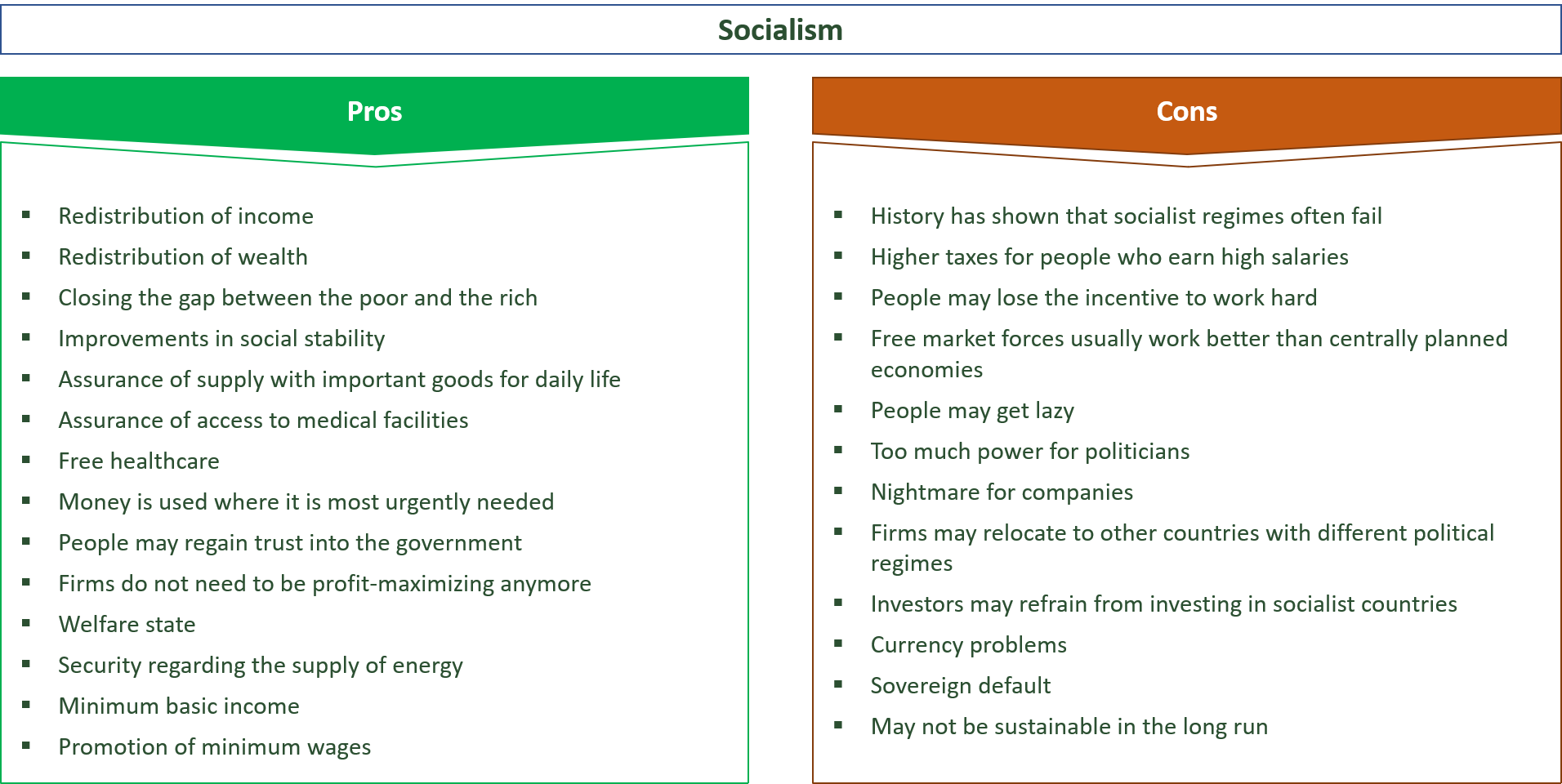“Democratic socialism means that we must create an economy that works for all, not just the very wealthy.”
Bernie Sanders, Politician
Advantages & Disadvantages of Socialism

Socialism is a political system in which the government controls all important production and distribution processes and the general public relies on the state for the supply with those important goods and services for their daily life.
Socialism aims for public rather than for private ownership.
Consequently, socialism is also often referred to as leftism.
Although socialism has many important advantages, there are also some problems related to this concept.
In this article, the pros and cons of socialism are examined.
Audio Lesson
Contents
Advantages of Socialism
- Redistribution of income
- Redistribution of wealth
- Closing the gap between the poor and the rich
- Improvements in social stability
- Assurance of supply with important goods for daily life
- Assurance of access to medical facilities
- Free healthcare
- Money is used where it is most urgently needed
- People may regain trust into the government
- Firms do not need to be profit-maximizing anymore
- Welfare state
- Security regarding the supply of energy
- Minimum basic income
- Promotion of minimum wages
- Better access to education
- Better chances for everyone to improve their quality of life
- Less poverty
- Less financial problems for retirees
- More regulations and rent caps on the housing market
- Exploitation of workers can be limited
- Monopolies are no longer possible
- Socialism may protect the poorest among us
- Environmental benefits
Redistribution of income
One important advantage of socialism is that people with high salaries have to pay much higher taxes and the additional tax revenue can be redistributed to the poor part of society.
Many people claim that there is no reason why some people should earn millions of dollars while other people just earn enough to survive.
Thus, socialism can help the poor part of our society to get more money in order to buy basic goods for their daily life.
Redistribution of wealth
Similar to the redistribution of income, socialism also aims to redistribute the overall wealth in a country.
Quite often, a small elite of people owns the majority of all wealth in a country.
In those regions, it may make sense to redistribute those enormous fortunes so that they can benefit the general public and not just a small group of lucky people on the top of the wealth pyramid.
Closing the gap between the poor and the rich
We often hear discussions regarding the gap between the rich and the poor.
Yet, politicians often just talk but do not take effective measures in order to mitigate this issue.
Socialism could help to close the gap between the rich and the poor since through the high taxation of wealth and high salaries, the rich would have to give away more of their money, which could in turn be used to improve the quality of life of the poor fraction of our society.
Improvements in social stability
The concept of socialism might also help to improve the overall social stability in our society.
Many people feel frustrated in our current state of the world since they work hard but are barely able to afford all basic things they need for their daily life.
At the same time, a minority of wealthy people earn really good money and can afford everything they want.
This may lead to serious social tensions in the future since people may no longer comply with the current system anymore in case the level of frustration of the majority of the population becomes too big.
In order to prevent social conflicts, it is crucial to redistribute some wealth in order to ensure social stability in a country, which can be accomplished by socialist regimes.
Assurance of supply with important goods for daily life
Socialism also aims to assure the supply of the general public with important goods for their daily life.
This can include the supply with food and water, but also various other goods that are crucial for the survival of the general public.
Since those important industry branches are controlled by the government in a socialist state, people can always be sure to get enough of those important goods and also do not have to fear significant increases in prices for those basic goods.
Assurance of access to medical facilities
Another benefit of socialism is that people will always have access to important medical facilities.
Apart from the food and water supply, also those medical institutions will be controlled by the government in a socialist country and people do no longer have to worry whether they are eligible for proper medical treatment or not.
Free healthcare
In many socialist regimes, healthcare is even free.
People do not have to spend any money on it since it is regarded as a human right to have proper healthcare and the healthcare system is entirely funded by tax revenue.
Therefore, especially for poor people who would otherwise not be able to afford health insurance, socialist regimes may greatly improve their quality of life since in case of medical emergency, those people could be sure to get proper medical treatment.
Money is used where it is most urgently needed
In socialist regimes, money flows from the top to the bottom, meaning that the rich have to give part of their wealth away while the poor will get more financial opportunities at the same time.
Therefore, those regimes can make a lot of sense since the money will be redistributed to the people who need it the most.
Since there is not too much benefit from buying the fifth car for rich people, this money could be better used in order to improve the overall quality of life for many poor people in our society.
People may regain trust into the government
Many people in our nowadays society are quite frustrated since they feel that the government only makes laws in favor of corporations and rich people instead of benefiting the general public.
With socialism, part of the lost trust into our governments may be restored since poor people may be able to increase their overall income levels and therefore their overall quality of life.
Firms do not need to be profit-maximizing anymore
In our current state of the world, many big companies are owned by shareholders and those shareholders generally require firms to behave in a profit-maximizing manner.
However, through the concept of profit maximization, many important social issues are not taken into account and profit maximization may lead to serious social and also environmental problems in the long run.
Hence, since firms do not need to act in a profit-maximizing manner in socialist regimes anymore, many of those adverse effects of profit maximization could be prevented.
Welfare state
In general, socialism aims to create a certain kind of welfare state in which the poor will be better protected and the rich have to give away part of their wealth in order to finance the poor.
Since in many countries, wealth is quite unequally distributed, socialism can be a great concept in order to improve the overall wealth levels of the general public so that those people will have a better chance to get out of poverty.
Security regarding the supply of energy
In a socialist regime, everyone can be sure to be supplied with sufficient amounts of energy.
Since energy production companies will be controlled by the state, chances are that this will lead to a more stable supply with energy.
Moreover, citizens will not have to fear that they run out of energy in case they do not pay their energy bill since in a socialist state, the supply with energy will often be a human right and will even be free in most cases.
Minimum basic income
Another upside of socialism is that those regimes often also promote to introduce a minimum basic income.
This means that every citizen will get a certain minimum basic income each month, independent from whether he or she wants to work or not.
Consequently, people also do not need to worry about unemployment too much in such a state since they know that they are covered by the government in case they lose their job.
Promotion of minimum wages
Socialist regimes also often aim for the implementation of minimum wages.
In many industries, workers are paid quite poorly in free-market environments.
However, through socialism and the introduction of minimum wages, people who have previously earned quite low wages would now be earning much more since companies would have to pay a much higher minimum wage.
Thus, especially for low-wage workers, socialism might greatly improve their overall working conditions as well as their income levels.
Better access to education
Socialism would also provide much better access to education for the poor part of our society.
It had been shown by many studies that the income and wealth levels of parents play a huge role in the level of education their children will achieve.
For instance, in case you are borne into a poor family, chances are that you will also suffer from rather low education levels and it will be quite hard for you to get out of poverty.
Through socialism, there will be plenty of free educational opportunities for the general public and therefore, it will be easier for everyone of us to get proper education and to get out of poverty in the long run.
Better chances for everyone to improve their quality of life
Socialism always aims to improve the living conditions of the general public.
Through the redistribution of wealth and investments in infrastructure that benefits the majority of the population, socialism can lead to a state where our overall quality of life may greatly improve over time.
Less poverty
Another major goal of socialism is to reduce the level of poverty amongst the general public.
In many countries all over the world, a small elite owns almost the whole wealth of a country.
Through the redistribution of this wealth from a small financial elite to the general public, the level of poverty in a country could be greatly reduced, at least in the short run.
Less financial problems for retirees
In many countries, pensioners often also suffer from quite low pensions, even though they worked for their entire life.
Those people often have barely enough money to pay their rent and to buy some basic food.
In order to improve the conditions of those poor pensioners, socialism could help significantly since in a socialist state, retirees would get a minimum pension that would be enough to easily cover all basic expenses that are necessary for a solid life.
More regulations and rent caps on the housing market
Many people in our current society also struggle to pay their rent.
Especially in big cities, rents have skyrocketed over the past decade and many people have to spend the majority of their income to afford rent payments.
Some people may even no longer be able to afford their rent and may end up homeless in the streets.
However, in socialist regimes, the government would likely introduce rent caps so that housing would remain affordable for the general public and people would no longer have to fear to end up homeless.
Exploitation of workers can be limited
Many workers, especially in poor parts of our planet, are still exploited and have to work quite long hours in exhausting jobs for a rather low salary.
Through socialism, the exploitation of workers could be prevented to a certain extent since minimum wages would guarantee a certain minimum income level, which would greatly benefit low-wage workers.
Monopolies are no longer possible
In some industries, a few or only one big global player dominates a specific industry.
Those monopolies are usually quite harmful to the general public since monopolies often imply that firms have market power and can therefore increase prices whenever they want to.
Thus, in order to prevent the formation of monopolies, socialism can help since in socialist states, those monopolies would likely be broken up in order to reduce the overall market power of those big corporations and to avoid the adverse effects related to monopolies.
Socialism may protect the poorest among us
Socialism aims to reduce income and wealth inequality through the redistribution of financial measures from the rich to the poor.
Therefore, socialism can be extremely beneficial for the poorest among us since they would have more money and more opportunities to improve their overall quality of life.
Environmental benefits
There are also some environmental benefits related to socialism.
Since socialism aims to improve the overall quality of life of the general public, chances are that in socialist regimes, also stricter regulations regarding pollution of several sorts would be introduced for companies, which would reduce our overall pollution levels and would ensure a more livable future for all of us in the long run.

Disadvantages of Socialism
- History has shown that socialist regimes often fail
- Higher taxes for people who earn high salaries
- People may lose the incentive to work hard
- Free market forces usually work better than centrally planned economies
- People may get lazy
- Too much power for politicians
- Nightmare for companies
- Firms may relocate to other countries with different political regimes
- Investors may refrain from investing in socialist countries
- Currency problems
- Sovereign default
- May not be sustainable in the long run
- Socialism may slow down technological progress
- Government may spend money in an inefficient manner
- Lower incentives to found startups
History has shown that socialist regimes often fail
Although socialism can have many important advantages, there are also many problems related to this political concept.
For instance, there are many examples in history where socialist regimes failed since governments run out of money sooner or later and also the public infrastructure suffered quite a lot in the long run.
Since history is always a good indicator of how things can turn out, relying on socialism may not be the way to go in most parts of our planet.
Higher taxes for people who earn high salaries
Some people may also consider it to be quite unfair that they have to give away a big fraction of their overall income to the state through taxes.
This might be quite frustrating and may lead to a point where those people may even leave the country and relocate to a foreign country in order to be able to keep more of their salary.
Therefore, many high-skilled workers may leave the country, which may greatly harm the local economy in the long run.
People may lose the incentive to work hard
Since people know that in socialist regimes, they have to give away a big fraction of their overall income, people may also simply lose the incentive to work hard.
Many people may rather give up their demanding jobs since it may no longer make sense to work in those jobs due to taxation issues.
However, if we take away the incentive of people to work hard, this may translate into serious problems since it may greatly lower our overall GDP.
In turn, less money could be redistributed and the state may go bankrupt sooner or later.
Free market forces usually work better than centrally planned economies
There are also many economists out there who claim that free market forces usually work much better compared to centrally planned economies in terms of the long-term success of a country.
Thus, if we believe those leading economists, socialism might not be the way to go and we should focus on regimes that provide more freedom in business instead.
People may get lazy
If people know that they get a certain minimum income from the state each month, they might also get quite lazy over time.
Many people may completely lose the incentive to go to work and may rather decide to stay at home and to watch TV or to do other things instead of spending their time in a job.
However, if too many people lose the incentive to work, the government may no longer be able to sustain sufficient tax revenue and the socialist regime may fail in the long run.
Too much power for politicians
Since in socialist regimes, the government controls many important industry branches, this also implies that governments will have great levels of power and the decisions of politicians may have a huge impact on the overall financial development of an economy.
In turn, this could lead to quite unpleasant economic outcomes for a country in case politicians either don’t know what they are doing or they act in their own interest instead of representing the interests of the general public.
Nightmare for companies
In general, socialist regimes are a nightmare for corporations since their overall level of economic freedom will be greatly confined and they would have to comply with excessive government regulations.
Moreover, corporations may also be forced to give away a high fraction of their profits.
Thus, for big companies, the concept of socialism is often quite harmful and many companies might search for loopholes to avoid the issues related to socialism for their business model.
Firms may relocate to other countries with different political regimes
If the downsides for firms become too big through the implementation of socialist regimes, chances are that many firms may also decide to relocate to other countries in which they can benefit from the concept of free market forces instead.
Therefore, if too many firms decide to relocate, tax revenue for socialist governments may decline significantly and the whole system may collapse over time.
Investors may refrain from investing in socialist countries
Another disadvantage related to socialist regimes is that global investors often refrain to invest in socialist countries since they fear getting expropriated or that they have to give away a majority of their income to the state.
However, private and corporate investments are crucial for a country to develop in a healthy manner and if the incentives for investors are taken away to invest in those countries, this may lead to quite unpleasant economic outcomes for socialist countries in the long run.
Currency problems
Since investors as well as companies might lose trust in socialist regimes over time, chances are that also the currency will greatly suffer in those countries.
Many people may no longer keep trust in the currency and may invest their income in other currencies instead.
In turn, the local currency will depreciate and imports will become much more expensive.
In turn, especially countries that are heavily dependent on imports will face severe financial problems.
Sovereign default
History has shown that many socialist countries will suffer from sovereign default in the long run.
Those socialist regimes simply do not work in a globalized world where money and investments can flow freely across country borders.
Thus, in order to avoid government failures and sovereign defaults, relying on other political regimes instead of socialism might be a good idea.
May not be sustainable in the long run
Due to the various financial reasons mentioned above, socialist regimes may also not be sustainable in the long run.
Sooner or later, the government will likely run out of money and the socialist regime may have to be replaced by regimes with a higher level of free market economy instead.
Socialism may slow down technological progress
Since investors will also have no incentive to invest in countries with socialist regimes, a lack of investments may also slow down the overall technological progress in a country.
Plenty of money has to be spent on research in development in order to speed up our technological progress.
However, if there are not sufficient investments that are made in a socialist country, chances are that also the technological progress will suffer.
Since we urgently need new inventions in order to solve our environmental problems, this could not only be detrimental to the finances of a country, but also for our planet.
Government may spend money in an inefficient manner
Many studies have also shown that governments often spend money in a quite inefficient manner.
Thus, if governments control a too high fraction of the overall economy, chances are that too much money is spent in an inefficient manner and that plenty of taxpayers’ money is wasted on unimportant prestige projects.
Lower incentives to found startups
Socialist regimes may also prevent people from founding their own company since they know that they will have to give away a high fraction of their profits in case their company becomes successful.
Thus, socialism may also not be a regime that promotes entrepreneurship, which in turn may further slow down our technological progress.

Top 10 Socialism Pros & Cons – Summary List
| Socialism Pros | Socialism Cons |
|---|---|
| Redistribution of a country’s wealth | Socialism has failed many times in history |
| Mitigation of poverty | Not sustainable in the long run |
| Better education opportunities | Government failure |
| Minimum wage | Socialism may take away incentive to work |
| Socialism can provide minimum basic income | Sovereign default |
| May improve conditions of the general public | Politicians can get too much power |
| Fewer problems for pensioners | Can be detrimental for firms |
| Avoidance of monopolies | Some companies may relocate |
| Assurance of supply with basic goods | Higher unemployment rates |
| May protect the poorest among us | May slow down technological progress |
Conclusion
Even though there are many advantages related to the political concept of socialism, there are also many issues related to it.
In my opinion, a purely socialist regime will not be sustainable in the long run and therefore, we should aim for a mix between socialist values and free market forces.
By implementing this policy mix, we can ensure social security on the one hand while also giving sufficient financial freedom to companies on the other hand.
Sources
https://en.wikipedia.org/wiki/Socialism
https://www.merriam-webster.com/dictionary/socialism
https://www.investopedia.com/terms/s/socialism.asp

About the author
My name is Andreas and my mission is to educate people of all ages about our environmental problems and how everyone can make a contribution to mitigate these issues.
As I went to university and got my Master’s degree in Economics, I did plenty of research in the field of Development Economics.
After finishing university, I traveled around the world. From this time on, I wanted to make a contribution to ensure a livable future for the next generations in every part of our beautiful planet.
Wanna make a contribution to save our environment? Share it!